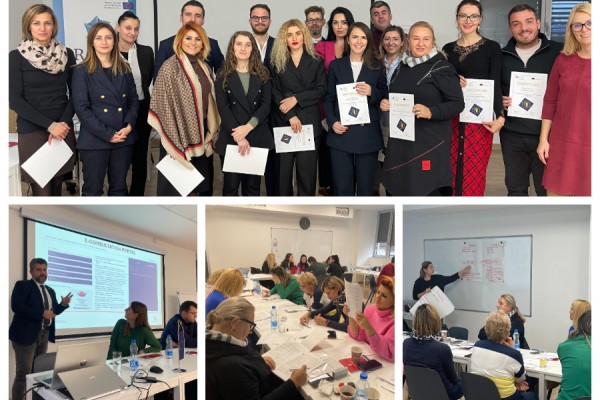
Executive Learning Programme on Better Regulation: Designing Regulatory Reforms and Improve Policymaking in the Western Balkans
Twenty professionals dealing with impact assessments and stakeholder consultation in Line Ministries and RIA Oversight Units across the Western Balkans attended the ReSPA Executive Learning Programme on Better Regulation, which tackled key concepts of Better Regulation and how they are applied across the policymaking and regulatory cycle. In a dynamic blend of interactive presentations, practical examples and group exercises, participants got insights into how the public sector implements regulatory impact assessment and stakeholder consultation, what are the main challenges and drawbacks of different modalities (including the innovative practices in EU Member States) and how the BR tools are used in practice in the European Commission.
ReSPA Director Maja Handjiska Trendafilova highlighted that “Better Regulation principles that span across the entire policy cycle ensure that policies are prepared in an open, transparent manner, informed by the best available evidence and backed by strong stakeholders’engagement”. The Director Handjiska also emphasized that “with the support of renowned trainers and practitioners, the Executive Programme guided 20 public servants in developing skills for building effective legal and regulatory agenda toward a more efficient policymaking process”.
On the first day of the Programme, Dragana Aleksić, the lead instructor, guided participants through the key concepts of Better Regulation and how they are applied across the policymaking cycle, as well as on the elements of a good and comprehensive RIA assessment. Renny Reyes, from the Regulatory Policy Division of OECD, presented Better Regulation practices across the European Union 2022, highlighting that most of the challenges that are faced by WBs administrations are also persistent in the majority of EU Member States.
The second day of the Programme focused on Quality control and ex-post evaluation of legislation and policies, where Anke Friebert, former director of the German Federal Academy of Public Administration and Dragana Aleksić presented roles and practices in European Union and the Western Balkans. Participants, through group exercises, simulated the evaluation of the quality of an RIA document and identified its weak and strong points. In addition, they developed the problem and objective tree, which is the first step when proposing new legislation or policies.
Participants met with senior officials of the Public Policy Secretariat of Serbia, where they discussed RIA and PIA in the Republic of Serbia, how the consultation process goes in Serbia and where Serbia stands in administrative simplification and reduction of the administrative burden.
The various methods used in impact assessments as well as relevance and methodology of public consultation were tackled during the third day of the Programme. Professor Branko Radulović from the University of Belgrade presented usage of methods such as Cost Benefit Analysis, Cost Effective Analysis, Multi Criteria Analysis in impact assessments, while Goran Forbici, lead trainer of the Slovenian Academy of PA, elaborated on the importance of public consultation (focusing on where we stand vs where we shall aim) and moderated a group exercise on public consultation.
ReSPA Programme Manager Coordinator, Genti Xhaxhiu emphasised that "with this executive programme, ReSPA boosted mutual learning & networking as well as reinforced a more systematic and comprehensive approach in the better regulation area. Connecting the Western Balkans with the EU's better regulation agenda, which is a synonym for regulatory reform and delivering policy objectives without creating unnecessary burdens for citizens, businesses and public administration is the ultimate goal of ReSPA. With this particular activity, I believe we provided valuable insights to the attendees to advance on their paths towards a less bureaucratic administration”.
The programme was delivered in the premises of the Serbian Academy of Public Administration (NAPA), therefore big thanks goes to our great host Dejan Miletić, NAPA Director, and the excellent NAPA team for welcoming us!



